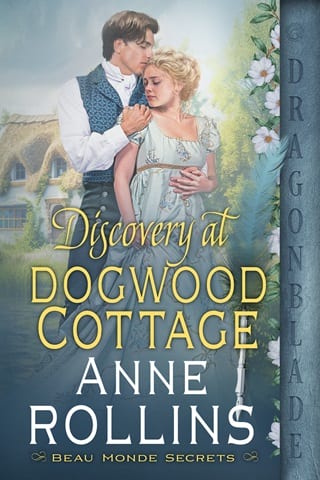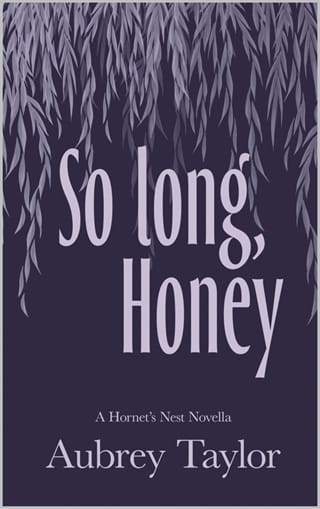Chapter Twenty-Five
F or the first half mile of his walk, George savagely kicked a stone along the road. The poor stone had done nothing to vex him, but something ought to suffer for the betrayal he’d experienced. Admittedly, “betrayal” seemed like too strong of a word, but he could think of it no other way.
George was not angry about Belle entering the study to clean up after him. If anything, that left him with the familiar sickness of shame in the pit of his stomach. She shouldn’t have had to come in there to pick up his dirty dishes, he ought to have put them away after using them. He knew that.
In his younger years, his mother had frequently scolded him for leaving the writing table in his room such a mess. In London, his charwoman had grumbled about his habit of leaving crumbs and dirty spoons everywhere. So, he should have realized his messiness might inconvenience other people here at the Cottage. He would have to come up with some better system.
Unfortunately, knowing he needed to clean up after himself had never helped him change his behavior in the past. His messiness, like his procrastination, seemed to be a habit he could not correct, no matter how ashamed he might feel about it.
The longer George spent reviewing his life, the more his spirits sank. God, he really was a failure, wasn’t he? What was it Priscilla had called him at the end of their affaire ? Ah, a “feckless good-for-naught.” He could hardly forget those words.
Maybe Priscilla had the right of it. Missing the deadline on that essay about Mesmer had cost George the opportunity to write any further articles for The Current Review . There were editors of other journals who might still be willing to work with him, but none of those journals had circulations anywhere nearly as high as The Current Review . None of them paid as well, either.
As for Peabody & Sherman—well, George had not even told Mr. Sherman that he’d given up working on Ermintrude, or the Lady in the Tower. His current project was shaping up to be much stronger, but the novel about Recusants was nothing like his previous work. What if Mr. Sherman didn’t want it? Then George would have to find a new publisher, that’s what! Who knew whether a different editor would even be able to read his messy handwriting?
By the time he reached Pendleford, George had gone from being angry at Belle for poking her nose into his work to despising himself for making such a mess of things. Or, rather, for being such a mess himself. Nothing he did ever turned out right. He could not turn an essay in on time, he could not write a novel that would sell, and he could not even clean up after himself. Even Charlie was better at tidying up the nursery than George was at keeping his study in order. Belle must be regretting marrying such a good-for naught.
It did not, at that moment, occur to him to wonder whether Belle considered him worthless, or thought him at all childish. He knew perfectly well that she’d been hurt by his snapping at her in the study. Clever and talented though she might be, there were some ways in which Belle seemed as fragile as the porcelain she collected. She ought never have married a blundering boar like George, and the sooner she realized—
“I say, Kirkland, what are you doing in town?”
George lifted his head and looked about, startled out of his self-recriminations. He’d been so abstracted, it took him a moment to place the young man who stood before him, carrying a heavy-looking black satchel.
Not a satchel, but a doctor’s kit. This was the young surgeon he’d met at the dinner party a couple of weeks back. George had seen him only briefly at church since then, but what little he’d seen had confirmed his impression that Arkwright was a man worth knowing. He seemed nearly as good natured as Cawley, and maybe a bit cleverer.
“Good afternoon, Arkwright. I just wanted a good long walk today. Helps me think, you know.” George shrugged his shoulders, feeling sheepish. He knew perfectly well that other people did not need to walk back and forth to get their minds moving, and he had no idea why he needed so much movement.
“You picked rather a foul day for a stroll,” Arkwright pointed out.
“Did I?” Wasn’t it a fair day? The sun had been shining this morning, and—“Oh!” The moment he peered up at the sky, George saw what Arkwright meant. Ominous black clouds had covered the late-afternoon sun. He took a deep breath and caught the tell-tale scent that heralded a thunderstorm.
Worse yet, a heavy rain drop plopped down right at George’s feet, leaving a dark spot on the dusty road. “Da—I mean, dash it all, you’re right. And I didn’t think to bring an umbrella.” He was lucky to have remembered his hat.
“Bad luck,” Arkwright said sympathetically. “But I’ve just seen my last patient, and my throat is dry as a bone. Why don’t you come have a pint with me at the Dove and Rose?”
“My wife will be expecting me home for dinner.” But before George could make his apologies, the heavens opened up. The light spattering of rain turned into a steady downpour. “On second thought, a drink might be nice.”
Arkwright chuckled and led him to a good-sized inn further down the main street. Not a big posting inn, the place seemed to serve primarily as a pub, with a few rooms for travelers. George supposed there probably weren’t many travelers who came through Pendleford, as it did not lie on a toll road.
“Mr. Arkwright, good to see you,” the publican called. “The usual for you?” He looked at George with undisguised curiosity.
“Yes, Robertson,” Arkwright said, “and a pint for Mr. Kirkland, too, if you please.”
“Coming right up!”
Arkwright led the way to a booth near the hearth. “We are lucky to grab so good a seat,” he noted. “The place gets crowded in bad weather, because anyone who can stop to get in out of the rain, does.”
“I didn’t expect to see it so busy,” George admitted. “Is it the only pub in town?”
“No, just the best. Mrs. Robertson used to cook at a great house near Preston, and the fare here is better than at most inns.”
George could see for himself that the public room was relatively clean, though the floor was growing damp from the flow of people coming in out of the rain. It being summer, no fire burned on the hearth, and the scent of fresh air suggested someone had opened a window recently. Compared to the smoky, fetid dining rooms at many public houses, this one was quite comfortable.
A young woman brought them heavy pint glasses. “Be you Mr. Kirkland?” she asked George.
“Yes, I am he.” George sat up straighter, feeling self-conscious. As a new resident in a middling-sized market town, he often found himself under observation. People naturally wanted to know about him. Particularly, they wanted to know how to persuade him to spend money in the local shops.
“Was that your brother who visited here last week?” the barmaid asked.
“What? No, I haven’t any brother.” Much to his father’s dismay. The Reverend Mr. Kirkland had hoped for a like-minded son to follow in his clerical footsteps. Instead, he only had a slovenly ne’er-do-well addicted to scribbling.
“I see. Only I thought he said his name Kirkland, too.”
George frowned, trying to remember when Benedict had visited the cottage. “One of my Kirkland cousins visited Pendleford in July, but that would’ve been a couple of weeks back. Could you be thinking of him?”
“Nay, that was another gentleman,” she insisted. “The one in July was taller than you, and his hair was sandy brown. But the fellow who was here Saturday last was shorter and his hair were straw-colored. He had blue eyes, too, I think. Or were they green?” She frowned.
“You don’t say!” The only Kirkland George knew with blue eyes and straw-colored hair was his cousin Augustus. But there were certainly other men by the name of Kirkland in England. Maybe the straw-haired young man came from the Cheshire branch of the family. Or maybe he wasn’t related at all, and his visit was pure coincidence.
“I’m afraid I don’t know the gentleman’s given name, sir,” the serving girl said. “He said he was here to visit a friend, and he only stayed the one night. Left Sunday afternoon in rather a hurry.”
George tightened his grip on the handle of his pint glass. “Sunday, you say,” he repeated. “Curious. We didn’t see him at all. Perhaps he wasn’t one of my cousins.” He forced a smile to his face. “Thank you for the information, miss.”
After she left to serve other customers, he stared down into his pint pot, lost in thought.
“Something wrong?” Arkwright suggested.
“Don’t know.” George looked up and grinned crookedly. “Seems a little odd if my cousin came through last Saturday and didn’t stop to visit with us. He must’ve been in a hurry.”
Or, George silently added, Augustus deliberately visited Dogwood Cottage while all its residents were at church or chapel, leaving the house ripe for trespassing and vandalism. Until now, it hadn’t occurred to him to suspect his cousins, he’d had no reason to think they were in the area. But if Augustus had been in Pendleford Sunday morning, he suddenly moved to the top of the list of suspects.
Well, in all honesty, he was one of the only suspects on George’s list. Assuming the Cawley boys told the truth when they denied having knocked over the dresser (which they weren’t strong enough to move) George couldn’t name anyone else who might have wanted to investigate the kitchen. Most of the local people knew about the legends, but how many of them would be desperate enough to break into the house? A local burglar couldn’t be ruled out, but George didn’t have the faintest clue where to begin searching for such a person.
Augustus and Benedict certainly had motive to break into the cottage. More than one motive, in fact. At that dinner party in Bath, Augustus had been very interested in the story of the treasure. Having failed to secure the cottage or Uncle William’s money himself, he might very well hope to find the mythical treasure as a consolation prize.
Alternatively, one or both of the brothers might feel vindictive about George having beaten them in the race to win the cottage. Some people would be perfectly willing to break in and smash Aunt Helena’s china just to get revenge. George did not know his cousins well enough to rule out that possibility.
“Is something wrong, Kirkland?”
Arkwright’s concern yanked George out of his flight of fancy and down to earth. He lifted his head and looked around the bar room. Outside, the rain fell more heavily than ever. Inside, the room had gotten louder and more crowded as people sought shelter from the downpour.
“Nothing’s wrong, exactly,” George said slowly. “At least not right now. I hope.” But who knew whether the burglar would strike again? If Augustus or Benedict had knocked over the dresser, would they consider that sufficient revenge, or would they try again?
“Well, if it’s a medical problem, I’m here to help you. Can’t help if it has anything to do with farming, though.”
That brought a grin to George’s face. “Nothing to do with health or agriculture.” He hesitated for a moment, considering how much he could tell a stranger. “It’s rather a curious problem,” he said slowly, “and it began with a story about treasure.”
George ending up telling Arkwright everything, though not necessarily in a clear, coherent order. He hadn’t intended to say anything about Uncle William’s ridiculous marriage competition, but he found it impossible to explain his suspicions about Augustus and Benedict without talking about that.
Arkwright’s jaw dropped at that part of the story. “Do you mean to tell me you married your wife only to get the cottage?”
A flush burned George’s cheeks. “We were already friends! It wasn’t as if I ran off and married the first stranger I met.” Though, now that he thought about it, that would make a good premise for a novel! “Er, one moment, please.” He pulled out his notebook and quickly down scribbled the idea.
When he looked up, Arkwright raised his brows, and George’s embarrassment grew to epic proportions. “Sorry, I just wanted to jot down an idea before I forgot it. I’m a little absent-minded, you know.” Little wasn’t quite accurate, but he would rather not explain just how absent-minded he really was. “Where was I?”
“You were explaining how you won your grandfather’s race, or whatever it was,” Arkwright said. “And now you think your cousins might be trying to steal the treasure?”
George sighed. “It sounds very silly when you put it like that. But some people obviously believe there’s a treasure at Dogwood Cottage. And I know my cousin Augustus is greedy, so...” He shrugged, unable to think of any more evidence to support his theory.
Arkwright nodded. “It makes sense. Have you talked to the constable about your suspicions?”
George furrowed his brow and drained the last sip of his ale. “Problem is, I don’t really have any evidence. And it’s not as if the constable at Pendleford is going to travel all the way to Manchester to interview my cousins on the off chance they might have committed a crime.”
“And it’s not as if they would admit the truth if you asked them about it,” Arkwright said. “What if you wrote to your uncle? Wouldn’t he be concerned?”
George turned that idea over in his mind, trying to see it from every angle. “You know, that is what I should do. Thanks!” His cousins would want to stay on Uncle William’s good side, since there were still thousands of pounds to be inherited when he died.
He sat up straight and subtly rolled his neck around, feeling some of his tension dissipate. He felt better now that he knew what to do next—as long as he didn’t forget. He pulled out the notebook and his pencil to make sure he recorded Arkwright’s suggestion. An otherwise miserable afternoon looked a bit more promising now.
When he glanced out the window, though, his face fell. “It’s still raining, isn’t it?” The rain had let up, becoming a drizzle rather than a downpour, but he would still get thoroughly soaked on the walk home.
“Why don’t you dine at our house,” Arkwright suggested, “and I’ll drive you home in my gig afterwards?”
“That is very kind of you, but my wife will worry about me if I don’t come home for dinner.” Especially since they’d quarreled before George stalked out of the house. But he didn’t plan to tell Arkwright that part of the story!
“She’ll realize you took shelter from the storm, won’t she?” Arkwright argued. “I doubt she’ll expect you to make good time in this weather. Most people stay off the road in the rain, if they can. There’s always a chance the river will overrun its banks if the rain is heavy enough.”
That convinced George. He really didn’t want to walk through mud and rain without an umbrella. His boots would be ruined! Well, except that they were already in terrible shape as it was. But they would be even more ruined. And Belle would understand his tardiness once he explained about the possibility of the river overflowing. She might be angry with him after the way he’d spoken to her, but she would not want him to drown in a flood.
At least, he hoped not.
 Fullepub
Fullepub 



